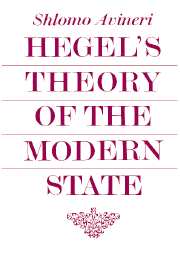Book contents
- Frontmatter
- Contents
- Title in the Series
- Preface
- 1 Beginnings
- 2 Positivity and Freedom
- 3 The Modernization of Germany
- 4 The New Era
- 5 Modern Life and Social Reality
- 6 The Owl of Minerva and the Critical Mind
- 7 The Political Economy of Modern Society
- 8 Social Classes, Representation and Pluralism
- 9 The State – the Consciousness of Freedom
- 10 War
- 11 The English Reform Bill – the Social Problem Again
- 12 History – the Progress towards the Consciousness of Freedom
- Epilogue
- Bibliography
- Index
8 - Social Classes, Representation and Pluralism
Published online by Cambridge University Press: 05 June 2012
- Frontmatter
- Contents
- Title in the Series
- Preface
- 1 Beginnings
- 2 Positivity and Freedom
- 3 The Modernization of Germany
- 4 The New Era
- 5 Modern Life and Social Reality
- 6 The Owl of Minerva and the Critical Mind
- 7 The Political Economy of Modern Society
- 8 Social Classes, Representation and Pluralism
- 9 The State – the Consciousness of Freedom
- 10 War
- 11 The English Reform Bill – the Social Problem Again
- 12 History – the Progress towards the Consciousness of Freedom
- Epilogue
- Bibliography
- Index
Summary
BUREAUCRACY – THE UNIVERSAL CLASS
Hegel's theory of social classes in the Philosophy of Right follows his general outline in the Realphilosophie; hence only a number of salient points need to be repeated here. However, the Philosophy of Right does contain a more detailed discussion of the universal class, the bureaucracy.
The origins of social differentiation are traced by Hegel to the social division of labour which is the consequence of social production:
The infinitely complex, criss-cross, movements of reciprocal production and exchange, and the equally infinite multiplicity of means therein employed, become crystallized, owing to the universality inherent in their content, and distinguished into general groups. As a result, the entire complex is built up into particular systems of needs, means, and the types of work relative to these needs, modes of satisfaction and of theoretical and practical education, i.e. into systems, to one or other of which individuals are assigned – in other words, into class-divisions.
There is however another aspect of class division, and this is the moment of integration. Belonging to a class links a person to a universal and hence classes are a mediator between man's purely individual existence and the wider context of his life: ‘When we say that a man must be a “somebody”, we mean that he should belong to some specific social class, since to be a somebody means to have a substantive being. A man with no class is a mere private person and his universality is not actualized.’
- Type
- Chapter
- Information
- Hegel's Theory of the Modern State , pp. 155 - 175Publisher: Cambridge University PressPrint publication year: 1972

